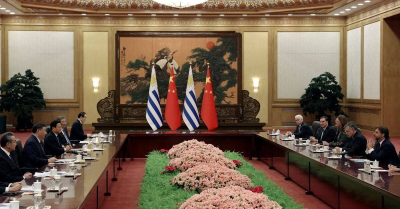Reuters-China Uruguay upgrade bilateral ties in boon for ambitious South American nation
November 22, 2023 4 min 778 words
这则报道揭示了中乌两国加强双边关系的意义。乌拉圭通过与中国升级合作,寻求在国际舞台上取得更多利益,不仅在贸易和投资方面有所提升,更使其与巴西、阿根廷等南美国家保持一致。报道中提到,中国愿意与乌拉圭建立全面战略伙伴关系,强调两国要共同努力丰富合作。乌拉圭总统在过去提议与中国签署自由贸易协定,以获取与智利、哥斯达黎加等国家相同的机会,但面临南共同市场成员的反对。然而,乌拉圭与中国签署的合作文件,涵盖农业、教育、科技等多个领域,对乌拉圭肉类出口等行业可能带来实质利益。此外,报道还指出乌拉圭是与中国保持贸易顺差的少数几个国家之一,去年达到了15亿美元。这一合作升级也可能使巴拉圭在中国的全球贸易和投资网络中更加边缘化。总体而言,中乌合作的提升为乌拉圭在国际舞台上的地位提供了新的机遇,对于中国来说,也有望确保其对南美洲新兴市场的资源供应。
China and Uruguay on Wednesday upgraded their bilateral ties, setting the stage for further trade and investment, as the tiny neighbour of Argentina and Brazil seeks to strike deals abroad that it deems would be more beneficial than membership of a local trade bloc.
At a meeting in Beijing's Great Hall of the People, Chinese President Xi Jinping told his Uruguayan counterpart Louis Lacalle Pou that: "China is ready to work with Uruguay to take establishing a comprehensive strategic partnership as a new starting point... and enrich cooperation," according to Chinese state media.
The announcement elevates Uruguay's ties with China to an equal footing with Brazil and Argentina, two other members of the Mercosur trade bloc.
For years, China has sought closer ties with the emerging markets of South America, in large part to secure raw materials including grains and oils for its economy. The world's second-largest economy is also a major investor and has offered tariff-free access to its huge consumer market to four states.
Lacalle Pou in 2021 first proposed a free trade agreement with China to secure similar opportunities for its exporters as those enjoyed by Chile, Costa Rica, Ecuador, and Peru, and to boost its exports of raw materials, industrial goods and technology, but faces opposition from other members of the Mercosur bloc who want to settle an FTA with Europe instead.
At present, China has no tariff preference for Uruguayan beef, which constituted 67% of the South American country's exports to the Asian giant in 2022, according to United Nations COMTRADE data, and in which market beef pays a 12% tariff. Australia and New Zealand, two other major beef exporters with FTAs with China, pay tariffs at 3.3% and 0%, by comparison.
Uruguay cannot easily sign an FTA with China because it agreed to a 'Common External Tariff' with the Mercosur members, so cannot unilaterally offer Beijing better terms. Not least because the bloc reached agreement in principle on an FTA with Brussels in 2019.
Under the Mercosur CET, Chinese exporters must pay tariffs at 9%, should they wish to export to Uruguay, which is better than the 12% tariff Uruguayan ranchers face when they ship beef to China.
According to a study conducted by the National Meat Institute of Uruguay in 2021, if China signs an FTA with Uruguay, the meat industry can implement a 0% preferential tariff, which will reduce tariffs by 150 million US dollars.
After the talks, Xi and Lacalle Pou witnessed the signing of several cooperation documents, across a wide of sectors including agriculture, education, and science and technology, as well as over customs inspections, which could be a boon for the Latin American country's meat exports.
Uruguay is one of the few countries to run a trade surplus with China, which last year doubled to $1.5 billion up from $766 million in 2021, according to data from China's National Bureau of Statistics.
The elevation of ties with Uruguay to the level of Brazil and Argentina also pushes the remaining Mercosur member Paraguay further outside of China's global trade and investment network. Agriculture-dependent Paraguay, whose main exports include beef and soybeans, is the last South American nation that has ties with democratically governed Taiwan, which China claims as part of its territory, and not with Beijing.
Xi said he hoped the two sides would work: "to build China-Uruguay relations into a model of solidarity and cooperation between countries of different sizes, systems and cultures."

